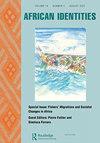Surviving the turbulence: a retrospective account of designed policies for mitigating the spread of COVID-19 in Ghana
Q1 Social Sciences
引用次数: 0
Abstract
ABSTRACTSeveral policies were designed during the COVID-19 pandemic to control the virus from spreading. However, little is known about the nature of the designed policies and how the citizens lived with the designed policies in Ghana. This paper attempts a retrospective exploratory account of the COVID-19 policies in Ghana through an amalgamation lens of design matrix and activity theory from 15 March to 10 July 2020. The population for the study was the COVID-19 policies adopted by Ghana. Out of 16 countries in West Africa with COVID-19 cases, Ghana was selected due to the online availability of its COVID-19 policies and the fact that the policies were in English. Content analysis was used to gather data on Ghana COVID-19 policies and innovative scenarios used for living with the designed policies. The results show that the designed policies adopted a top down approach and were difficult for the citizens to live with but most were adjusted later, which triggered social and economic challenges for the citizens and were to some extent mitigated by the government and the citizens through innovations. Therefore, the government should leverage ideas from the citizens and engage social designers in policy design through the proposed hybrid-designed model.KEYWORDS: COVID-19activity theorydesignpolicyinnovation Disclosure statementNo potential conflict of interest was reported by the author(s).Additional informationNotes on contributorsGinn Bonsu AssibeyGinn Bonsu Assibey holds a doctorate in Design from the Cape Peninsula University of Technology. He is a lecturer in the Department of Communication Design at Kwame Nkrumah University of Science and Technology, Ghana. His research interests include Sustainable design, Social Innovation and Design Education. He works mostly in two research paradigms – interpretivism and pragmatism – which are driven by learning through participation.Alettia ChisinAlettia Chisin is a senior lecturer at the Cape Peninsula University of Technology in the Design department and is currently active in post-graduate supervision in that department. Her research interests include practice-led explorations based on printmaking techniques and creative writing to inform design research. She has supervised many Masters Students and is currently engaged in doctoral supervision. Her research areas include design for sustainability, socially conscious design, and designerly approach to environmental issues relating to climate change.在动荡中生存:回顾为减轻COVID-19在加纳的传播而设计的政策
摘要在2019冠状病毒病大流行期间,制定了多项政策来控制病毒的传播。然而,人们对设计政策的性质以及加纳公民如何在设计政策下生活知之甚少。本文试图通过设计矩阵和活动理论的融合视角,对2020年3月15日至7月10日期间加纳的COVID-19政策进行回顾性探索性描述。该研究的人群是加纳采取的COVID-19政策。在出现COVID-19病例的16个西非国家中,加纳被选中是因为该国的COVID-19政策可以在网上获得,而且这些政策是英文的。内容分析用于收集有关加纳COVID-19政策的数据以及用于实施设计政策的创新情景。结果表明,所设计的政策采用自上而下的方式,市民难以接受,但大多是后期调整的,这给市民带来了社会和经济挑战,政府和市民通过创新在一定程度上缓解了这些挑战。因此,政府应该通过提出的混合设计模式,充分利用公民的想法,让社会设计师参与政策设计。关键词:covid -19活动理论设计政策创新披露声明作者未报告潜在利益冲突。ginn Bonsu Assibey拥有开普半岛科技大学的设计博士学位。他是加纳夸梅·恩克鲁玛科技大学传播设计系的讲师。主要研究方向为可持续设计、社会创新和设计教育。他主要从事两种研究范式——解释主义和实用主义——这两种范式都是由参与学习驱动的。Alettia Chisin是开普半岛科技大学设计系的高级讲师,目前活跃于该系的研究生指导工作。她的研究兴趣包括以实践为主导的探索,以版画技术和创意写作为基础,为设计研究提供信息。曾指导多名硕士生,目前从事博士生指导工作。她的研究领域包括可持续发展设计,社会意识设计,以及与气候变化有关的环境问题的设计师方法。
本文章由计算机程序翻译,如有差异,请以英文原文为准。
求助全文
约1分钟内获得全文
求助全文

 求助内容:
求助内容: 应助结果提醒方式:
应助结果提醒方式:


